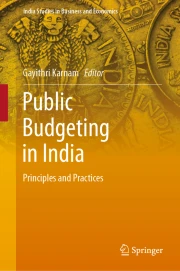
This is a preview of subscription content, log in via an institution to check access.
Hardcover Book EUR 52.74
Price includes VAT (France)Tax calculation will be finalised at checkout
This book explores public budgeting in India. As government finances play an important role in the social and economic development of a nation, it focuses on public budgeting in the context of India. The respective chapters not only discuss the underlying principles of budgeting, but also address the practical issues related to the government’s financial operations and their macro-economic implications. Recently there has been considerable debate surrounding the size of government, with the neo-liberal framework advocating a very limited governmental role.
This book provides comprehensive information on the practical aspects of public budgeting with regard to how governments raise revenues, how they are spent, the nature of public services provided, and their implications for the social and economic development of the country against the backdrop of public budgeting theory. The topics covered include the constitutional fiscal framework; theories, structure and issues related to budgets; mechanisms of budget construction, budget execution, public budgeting and performance assessment; government accounting; and financial accountability.
Gayithri Karnam is a Professor of Economics at the Center for Economic Studies and Policy, Institute for Social and Economic Change, Bangalore, India. She specializes in the areas of public economics, industrial economics and public policy studies. She has conducted extensive research in the area of state fiscal studies, public expenditure planning and management, budget reforms. She has served as an advisor on a number of state government committees and as consultant to international donor agencies like USAID and DFID for state level fiscal studies. She has been a recipient of Shastri Indo Canadian faculty research fellowship twice to undertake comparative fiscal studies at the Carleton University, Canada. She has undergone training at the Duke Center for International Development, Duke University (Durham, USA) on aspects relating to ‘public budgeting and financial management’. She has also participated in the executive education program on ‘Public financial management in a changing world’ at the John F Kennedy School of Government at the Harvard University, Boston.